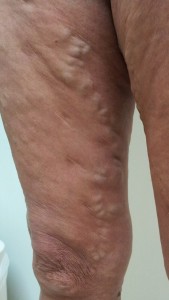The re-appearance or enlargement of residual varicose veins (VVs) may occur after all the different methods of treatment. It is unlikely that any one treatment will ever provide a complete protection against recurrence. This is related to the fact that patients have an inherent weakness in the wall of their veins. Relentless pressure from gravitational forces exploits this weakness and, given enough time, all patients could eventually develop a recurrence. A clear distinction should be made as to the initial treatment aims: obliteration of the disfigurement caused by the VVs themselves or the improvement in venous drainage of the leg by the abolition of reflux. Although both aims may equate to the same procedure, the latter focuses on the reduction of venous symptoms caused by prolonged venous pressure. Patients with early recurrences despite adequate treatment may have venous obstruction requiring further investigation.
LENA BLOMGREN Recurrence after treatment for VVs is common. The incidence ranges from 35-70% after more than two years follow-up. Some are due to patient-related factors, such as a high BMI, hormonal influences in pregnancy and progression of disease. A thorough preoperative investigation with duplex and meticulous operative technique may reduce the surgical cause of error, leaving less residual VVs. But what is the correct surgical technique? Endovenous laser or radiofrequency ablation, open surgery or foam sclerotherapy. All these had comparable results in a recent randomized clinical trial. However, sclerotherapy had slightly more recurrences. Controversy exists regarding the role of refluxing perforating veins and groin tributaries and the extent these should be targeted in treatment. There is also a debate as to whether all VVs need to be removed, with the complete abolition of reflux, versus selectively ablating venous shunts to reduce reflux and correct haemodynamic overload. The formation of new vessels in a previously operated tissue (neovascularization) is a controversial phenomenon. It may be just an innocent bystander or major cause for recurrence or a combination of both. More research is needed to improve the long term results after VV treatment.
